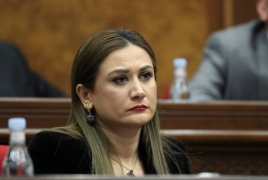
Armenian MP Arusyak Julhakyan, speaking at the Parliamentary Assembly of the Council of Europe (PACE), raised concerns over Azerbaijan’s open refusal to comply with the European Court of Human Rights (ECHR) rulings, citing it as a dangerous precedent and a serious problem within the organization.
During the annual spring session of PACE in Strasbourg, Julhakyan noted that 21% of the ECHR's judgments remain unexecuted by member states, stressing the significance of this enforcement gap. “This is a serious issue,” she emphasized, pointing out that Azerbaijani President Ilham Aliyev had recently stated at the “Towards a New World Order” forum that his country would not follow ECHR decisions due to the suspension of its PACE delegation’s powers. “Is this acceptable to us?” Julhakyan questioned.
She highlighted that over 33,000 rulings have been issued by the ECHR, but as of February 2025, more than 6,800 remain unexecuted and under the supervision of the Committee of Ministers. Around 1,150 of these are under enhanced supervision, requiring general measures to prevent repeat human rights violations.
Julhakyan further underscored the importance of interim measures, which the court imposes only in exceptional cases involving immediate risk of irreparable harm—such as threats to life. However, she criticized the Committee of Ministers for lacking sufficient authority to enforce these interim measures.
She warned that non-compliance undermines the Convention system’s credibility, calling for a reaffirmation of the binding nature of ECHR judgments and the need to expand enforcement tools. “We cannot ignore the shameful statistics of non-implementation,” Julhakyan concluded, urging the Council to either introduce new mechanisms to enforce compliance or consider sanctions against countries that blatantly disregard their human rights obligations.

